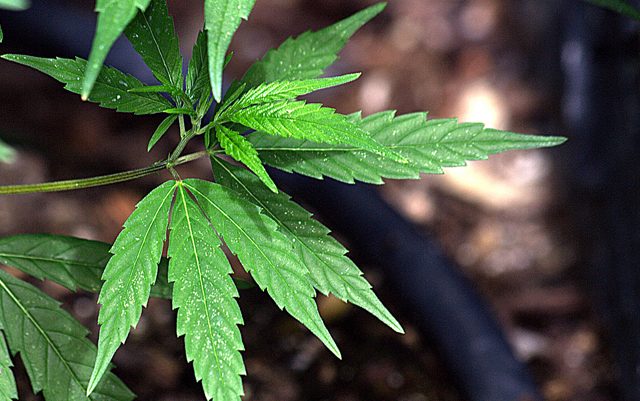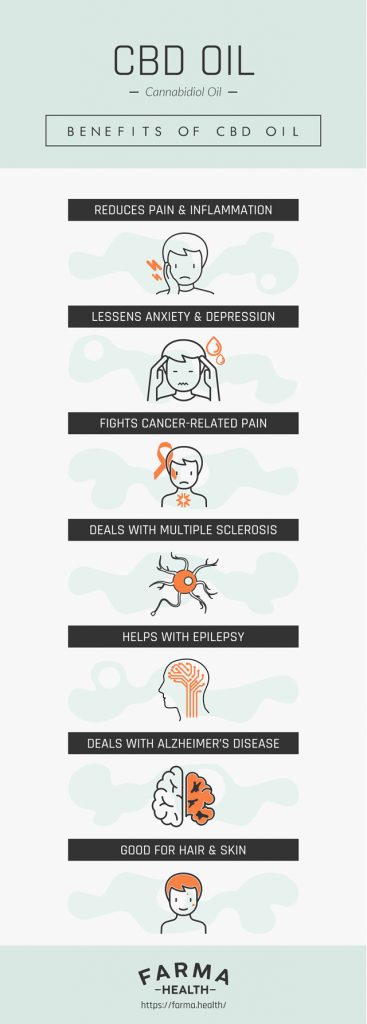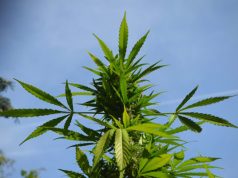After sustained campaigns and fights for the legalization of marijuana, most governments have finally given in to the demands. Marijuana, especially medicinal marijuana, has been decriminalized in most states. The marijuana industry is booming with renowned companies now investing heavily in research targeting the medicinal benefits of this once feared substance.
Cannabis sativa, the plant whose leaves, twigs and buds are harvested and processed, contains over 100 cannabinoids. Out of all these, CBD and THC have been well studied and documented. THC is responsible for the psychoactive effects and the feeling of ‘high’ associated with marijuana use, whereas CBD is responsible for the medicinal properties of marijuana.
Despite many hurdles, a rapidly growing body of research and clinical trials have yielded enough evidence supporting the biological benefits of CBD. This novel compound binds to CB2 receptors of the endocannabinoid system and in the process, it alters several physiological processes – including inflammation, pain sensation, and neurotransmission.
Currently, CBD oil has been approved by the FDA for the management of several chronic ailments. Additionally, CBD oil is being used off-label to alleviate numerous conditions. Discussed below are a couple of CBD oil benefits:
Epilepsy
Research studies have shown CBD oil to possess significant anti-seizure properties. In fact, this invaluable benefit first came to light when CNN ran a documentary of a child suffering from Dravet syndrome – a severe form of epilepsy – whose symptoms and frequency of epileptic attacks were significantly reduced by CBD oil.
Since then, further research and trials have shown CBD to be effective in the treatment of many forms of seizures, some of which are resistant to conventional anticonvulsants. Furthermore, CBD oil lacks the adverse reactions and side effects associated with these anti-seizure drugs.
Chronic Pain
By binding to CB2 receptors, experimental studies have shown CBD can alter non-receptive responses. As a result, CBD possesses excellent analgesic properties which have been utilized in the management of chronic pain states, such as neuropathic pain, cancer pain, and inflammatory pain.
There are several CBD oil preparations which can be administered either systemically or intrathecally in order to suppress pain. In Canada, some preparations containing carefully titrated doses of THC and CBD have been given the green light by the government to be used in pain management.
Uniquely, CBD oil used for analgesia has an excellent side effect profile. Unlike NSAIDs, it does not cause ulcers. It is neither addictive nor does it create a state of dependence, a common feature of opioids analgesics. In fact, CBD oil is being used experimentally as a potential candidate for the treatment of opioid addiction.
Anxiety
Studies using animal models and human volunteers have shown that CBD has potential anxiolytic properties. In pets, such as dogs with anxiety problems, an addition of CBD oil into their meals greatly calms the animals. Similarly, in humans with social phobias and social anxiety disorder, administration of CBD oil alleviates anxiety symptoms and at the same time improves cognition and speech.
Depression
The use of CBD oil in the treatment of depression, especially refractory major depressive disorder, is like a double-edged sword. At lower doses, CBD has excellent anti-depressive effects; at higher doses, CBD has been shown to have sedative effects. Hence, the dosage used must be within the optimal range or better, and it should be individualized depending on the patient’s response.
CBD’s antidepressant effects stem from its ability to interact with glutamate and serotonergic cortical pathways via type 1A serotonin receptors. Whereas the therapeutic effects of commonly used antidepressants may take up to two weeks to set in, those of CBD are fast – almost instantaneous.
Chronic Inflammatory Diseases
Acting via the CB2 receptors, CBD has been shown to modulate immune responses, such as inflammatory responses, leukocyte chemotaxis, inhibition of mast cell activation and inhibition of nitric oxide synthase activity. The overall effect is the inhibition of the inflammatory process.
As a result, CBD has attracted huge attention as a potential drug to manage disease conditions arising from dysregulated immune responses, such as rheumatoid arthritis, inflammatory bowel disease, and psoriasis. Apart from controlling the underlying inflammatory process, CBD has the advantage of treating the severe pain associated with these diseases.
Diabetes
The potential use of CBD in the treatment of diabetes is still young, but it is worthwhile to mention that ongoing experiments and trials have yielded promising results. Animal models have shown that CBD reduces the incidence of diabetes significantly. In humans, CBD seems to slow down the progression of beta cell damage towards overt diabetes.
Neurodegenerative Disorders
CBD oil possesses neuroprotective properties. It is an excellent antioxidant that can protect the brain from the harmful effects of free reactive oxygen radicals which underlie the brain damage, amnesia, dementia, cognitive disturbances and cerebral ischemia associated with neurodegenerative disorders such as Parkinson’s disease and Alzheimer’s disease.
Management of Drug Addiction, Cigarette Cessation
While this may sound absurd and ironical, especially when one considers how THC – CBD’s sister compound – can be psychologically addictive, many studies have shown that CBD oil is effective in curbing nicotine addiction associated with cigarette smoking. It has also been found to be effective in the management of withdrawal symptoms associated with smoking cessation.
With the roles of the endocannabinoid system being increasingly known, especially its roles in drug addiction and humans’ brain reward centres, CBD has the prime potential to treat many other forms of substance addiction, including opioids, cocaine and other psychostimulants.
Cancer Prevention
Several studies have pointed out the possibility of intrinsic anti-tumour effects of CBD. It is thought that CBD can inhibit the multiplication and spread of tumour cells throughout the body. It is postulated that CBD increases apoptosis of tumour cells.
While the benefits of CBD seems numerous, much effort is needed to fully exploit its potential. The few mentioned benefits here represent just a tip of the iceberg. Also, as people embrace these benefits, we ought to exercise some caution to avoid being drawn to exaggerated and sensationalized benefits.
Myths Associated with CBD
Also worth mentioning are the numerous myths about CBD. The most common being with regard to CBD’s psychoactive effects. This once common myth has since been debunked. It is now general knowledge that it is THC which is responsible for the psychoactive effects, and not CBD.
On the street, there is this common myth that CBD products, such as creams, oils, and cookies, are illegal. In most U.S. states and many other countries where marijuana has been decriminalized, access and use of CBD is no longer prohibited. Even in places where marijuana is still a regulated substance, CBD oil for medicinal purposes is generally allowed.
As we have seen, CBD oil has a lot of medicinal benefits, and their exploitation is long overdue. Many lives would have been saved and suffering reduced if the discovery has been made a bit earlier. As more research is done, we believe that more benefits of CBD oil will be uncovered.
Disclaimer: This article is intended for information and educational purposes only and is not intended to reflect the views of the publication.








The FDA has only approved one specific CBD medication for one specific use only. In June 2018 (https://www.fda.gov/newsevents/newsroom/pressannouncements/ucm611047.htm) the FDA said it remains “concerned about the proliferation and illegal marketing of *unapproved CBD-containing products* with unproven medical claims” and that they will continue to take action “… against companies distributing unapproved CBD products.” They went on to say that CBD products “have been marketed in a variety of formulations, such as oil drops, capsules, syrups, teas, and topical lotions and creams. These companies have claimed that various CBD products could be used to treat or cure serious diseases such as cancer with no scientific evidence to support such claims. We’ll continue to take action when we see the illegal marketing of CBD-containing products with unproven medical claims. We’re especially concerned when these products are marketed for serious or life threatening diseases, where the illegal promotion of an unproven compound could discourage a patient from seeking other therapies that have proven benefits.” SOURCE: FDA COMMISSIONER Scott Gottlieb, M.D. June 25 2018